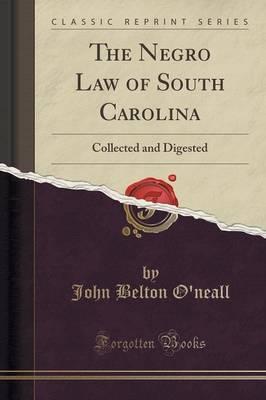 Image 1 of
Image 1 of


The Negro Law of South Carolina
Excerpt from The Negro Law of South Carolina: Collected and Digested Section 1. The Act of 1740, sec. I, declares all negroes and Indians, (free Indians in amity with this Government, negroes, mulattoes and mestizoes, who now are free, excepted) to be slaves: - the offspring to follow the condition of the mother: and that such slaves are chattels personal. Sec. 2. Under this provision it has been uniformly held, that color is prima facie evidence, that the party bearing the color of a negro, mulatto or mestizo, is a slave: but the same prima facie result does not follow from the Indian color. Sec. 3. Indians, and descendants of Indians are regarded as free Indians, in amity with this government, until the contrary be shown. In the second proviso of sec. 1, of the Act of 1740, it is declared that "every negro, Indian, mulatto and mestizo is a slave unless the contrary can be made to appear" - yet, in the...
Excerpt from The Negro Law of South Carolina: Collected and Digested Section 1. The Act of 1740, sec. I, declares all negroes and Indians, (free Indians in amity with this Government, negroes, mulattoes and mestizoes, who now are free, excepted) to be slaves: - the offspring to follow the condition of the mother: and that such slaves are chattels personal. Sec. 2. Under this provision it has been uniformly held, that color is prima facie evidence, that the party bearing the color of a negro, mulatto or mestizo, is a slave: but the same prima facie result does not follow from the Indian color. Sec. 3. Indians, and descendants of Indians are regarded as free Indians, in amity with this government, until the contrary be shown. In the second proviso of sec. 1, of the Act of 1740, it is declared that "every negro, Indian, mulatto and mestizo is a slave unless the contrary can be made to appear" - yet, in the...
Excerpt from The Negro Law of South Carolina: Collected and Digested Section 1. The Act of 1740, sec. I, declares all negroes and Indians, (free Indians in amity with this Government, negroes, mulattoes and mestizoes, who now are free, excepted) to be slaves: - the offspring to follow the condition of the mother: and that such slaves are chattels personal. Sec. 2. Under this provision it has been uniformly held, that color is prima facie evidence, that the party bearing the color of a negro, mulatto or mestizo, is a slave: but the same prima facie result does not follow from the Indian color. Sec. 3. Indians, and descendants of Indians are regarded as free Indians, in amity with this government, until the contrary be shown. In the second proviso of sec. 1, of the Act of 1740, it is declared that "every negro, Indian, mulatto and mestizo is a slave unless the contrary can be made to appear" - yet, in the...
